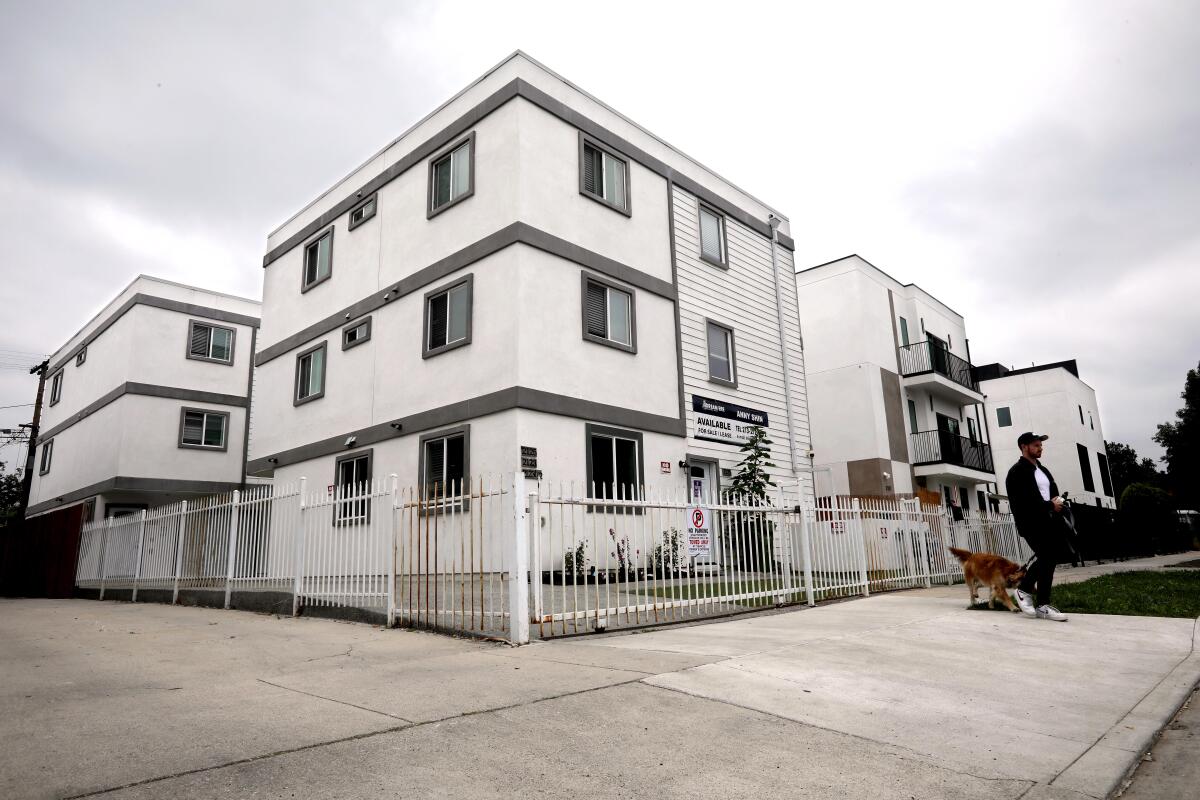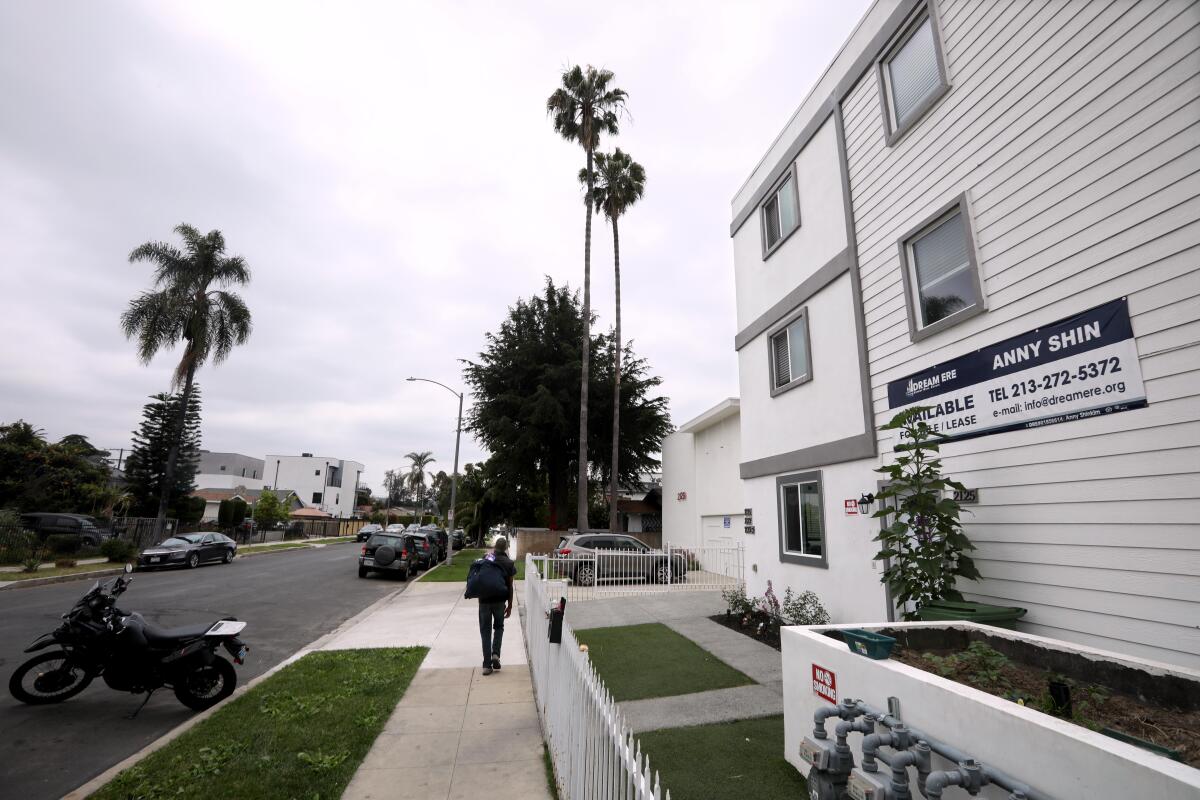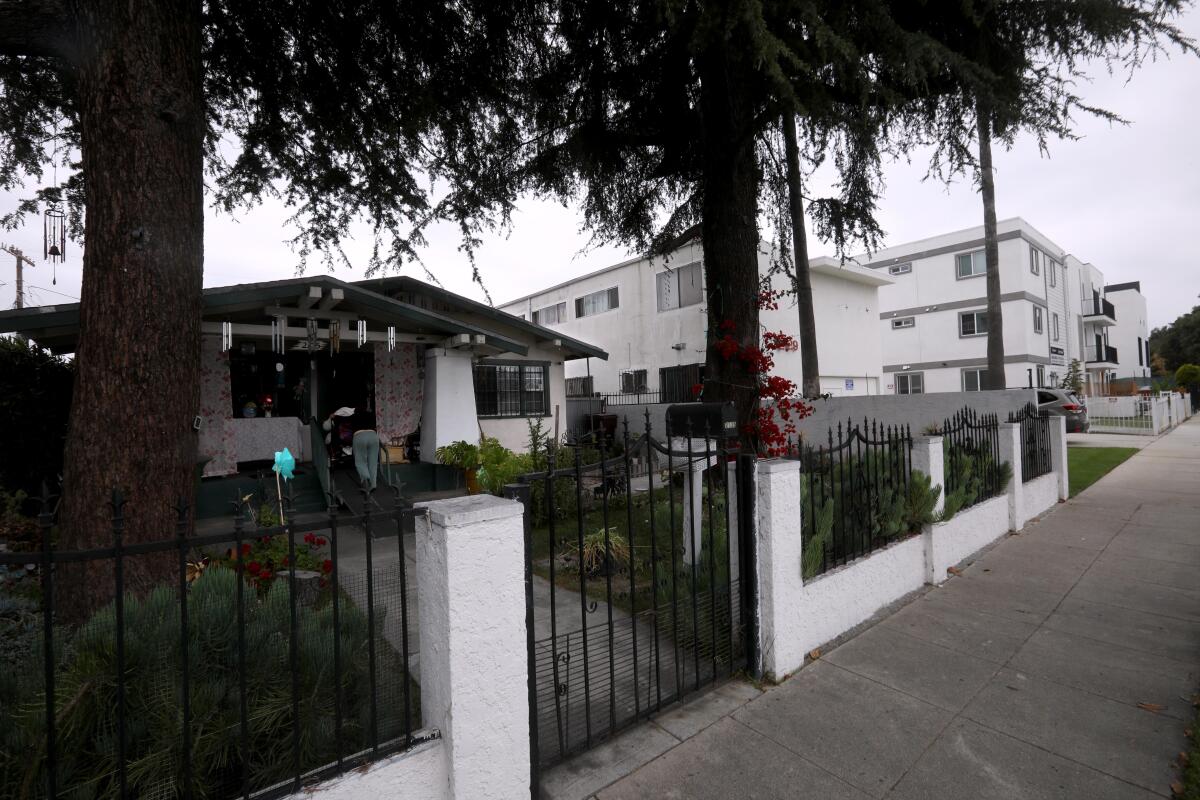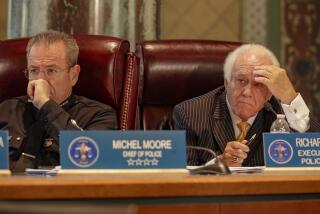Illegal hostels are popping up in L.A. neighborhoods, to some residents’ ire

- Share via
In a mostly quiet neighborhood of older homes and small apartment buildings, some residents have drawn their own no-go zones around what might sound like a crash pad for traveling backpackers: hostels.
At least two of them have popped up on West View Street in Mid-City Heights in the past few years, with more in surrounding neighborhoods.
Residents say they’ve seen strangers smoke marijuana and drink alcohol outside the newly built buildings. They say the properties draw drug deals and a frequent police presence. A few months ago, a woman ranted in the street outside one of the properties for hours, at times alleging someone stole something from her.
Adriana Marcial said one night her husband caught two men having sex in front of the home they share with their two children. When he startled the men, she said they left and entered one of the hostels.
“About a year ago, we stopped walking through there,” said Marcial, 38. “You get that vibe of feeling unsafe.”
Long associated with backpackers and young travelers, hostels typically offer cheap dorm-style beds and a shared kitchen. They can be a social place to meet people from around the world and, at times, the start of an alcohol- or drug-fueled night.
In Europe, such facilities often are located in bustling corners of the city. But in Los Angeles, hostels are opening for business within residential neighborhoods they’re not allowed in, drawing the ire of some Angelenos who say a revolving cast of characters has brought an increase in noise and crime.
With beds as cheap as $25 a night, the properties also serve as an option for people struggling to make ends meet, providing a relief valve in an expensive city where thousands sleep on the streets.
According to the Department of City Planning, hostels are banned in low-density residential neighborhoods like Mid-City Heights. The budget-stay properties can operate in high-density residential neighborhoods like parts of Koreatown, but need a special permit to do so.
A recent Times search of an online booking site found seven Los Angeles hostels advertised in low-density residential areas where the planning department says the facilities aren’t allowed.
The numbers could be greater. According to an October motion from Councilwoman Heather Hutt, there were at least 28 illegal hostels operating in Council District 10 alone. The district includes Koreatown and parts of South L.A., as well as Mid-City Heights and the larger Mid-City neighborhood.
Some people who stayed at one hostel described it as a quiet, affordable place as they traveled L.A. or sought a full-time job. Others were students or had low-wage work.
“Everyone here is trying to get by,” said Chris Smoot, who had been staying in a West View Street hostel for three weeks. The 44-year-old was trying to find work and establish permanent housing so he could bring his family out from Florida.

Hutt’s motion paints a more ominous picture, saying neighbors have complained that a variety of crimes are “radiating from these properties” — including battery and drug use — and that the police department has experienced “heightened” calls for service.
In approving the motion in December, the City Council ordered multiple departments to create a plan to crack down on illegal hostels, which the motion said two departments had been unable to do so, in part because of jurisdictional issues.
The council also established an enforcement task force specifically for Mid-City.
Devyn Bakewell, a spokeswoman for Hutt, said the task force’s work is ongoing and that the city attorney has issued “citations to certain addresses and has put several locations on notice about illegal land use.”
In Mid-City Heights, residents say officials should have — and still need to — act faster, noting at least one hostel still appears to be in operation.
Explore the latest prices for homes and rentals in and around Los Angeles.
Neighbor complaints also extend to two other newly built buildings that house short-term residents, which they say shouldn’t be in a neighborhood with children.
One is a sober-living home owned in part by a man named Nathan Young, according to his attorney Marc Williams. Young and others were sued last year by insurance company Aetna, which alleged they ran sober-living homes in Los Angeles and Orange counties that were “little more than drug dens.”
In a statement shared by Williams, Young denied Aetna’s allegations and said the sober-living home in Mid-City Heights is “dedicated to housing families with a parent in addiction recovery” and it has been successful in rebuilding lives.
Neighbors say they’ve seen people from the facility drinking alcohol and smoking marijuana in public and one neighbor said he saw what appeared to be a Nazi SS flag draped from a window on the site.
Young said they had the offensive flag taken down immediately after hearing of it and that “idea that we encourage the use of drugs and alcohol is ridiculous and diametrically opposed to our mission.”
The other property is leased by a homeless-services provider who previously provided housing on site to people exiting jail and prison, according to the Los Angeles Homeless Services Authority, which funded the program.
LAHSA said that this use stopped in September and that the service provider, Abundant Blessings, told the agency that a County Department of Mental Health-funded program has operated on site since.
A spokesperson with the mental health department said they found no record of a department program operating at the address and that the department does not have a relationship with Abundant Blessings.
Alex Soofer, executive director for Abundant Blessings, declined to comment, including to say what his organization currently uses the property for.
Barbara Matson lives behind that property with her husband and 8-year old daughter. Last year, she said, she awoke around midnight to a man throwing furniture.
“I am free,” Matson recalled the man screaming and using profanities. “I wasn’t sure if . . . he might jump over my fence.”
Matson said she no longer hosts backyard birthday parties for her daughter.
The uses Mid City-Heights residents cite as concerns exist in a type of housing that’s grown increasingly common in some Los Angeles neighborhoods where single family homes sit on lots the city has long zoned for a few more units.
There, developers are knocking down small, old houses and building multistory box-like structures with as many as five bedrooms. At some developments, there are two new duplexes on a lot, while others have a new single-family home on one side and a duplex on the other.
In some corners of South L.A., landlords specialize in renting these new properties to large families on a permanent basis.
Near USC, the housing style is used for student housing and has led to concern developers have displaced long-term residents.
Some in Mid-City Heights said since the new buildings went up in their neighborhood they’ve noticed an increase in strangers — some of them aggressive — walking the streets, but don’t always know where they come from. They also say they’ve found more syringes, condoms and other trash.
With more duplex developments underway, neighbors have concerns. They said they would welcome it if people looking for a permanent home moved into the buildings, but want temporary stays ended.
“We are being oversaturated,” said Roxana Brusso, who has owned a home in the neighborhood since 2008. “The city is asking us to sacrifice our safety, quality of life and property values.”
Marcial put it this way: “You just never know who is coming. Maybe it’s not always bad people, but it’s not always good people.”
The city has taken some action against the West View Street hostels.
In 2023, the Department of Building and Safety cited a newly built duplex for use as an unapproved hostel and the building appears to no longer be used as such, according to neighbors.
On the other side of the street and a few doors down, LA Modern Hostel received the same citation more than a year ago. Two Times reporters booked beds there in early May.
Located at 2125 S. West View St., the hostel sits inside a white single-family house with gray trim. Built in 2021, the three-story box sits on the front of a 6,000 square-foot lot. In the back is a duplex, built the same year.
Written reviews on the website Hostel World are mostly negative and describe a difficult check-in process, with one person saying they never got inside and were forced to “walk all night.”
Another reviewer described a dirty bathroom and a room where “it seemed nobody had personal hygiene skills.”
So far this year, city records show police were called to the address to investigate reports of two disturbances, a theft, an instance of vandalism and a battery.
In a three-day span last year, police responded to reports of an assault with a deadly weapon, a prowler, a burglary and a disturbance.
LAPD Officer Hector Marquez said issues — including loitering, theft allegations and disputes — have spilled into the neighborhood from the property and disrupted residents’ quality of life, but there’s been no evidence of violent crime.

On a recent Thursday, the hostel was calm. At check-in, a worker told Times reporters there were no drugs, alcohol or weapons allowed. Smoking was to be in the back of the lot — in an outdoor common area behind the duplex.
Inside the single-family house at the front of the property, there were six numbered rooms across two floors. Room 2 had four bunk beds accommodating eight twin mattresses, some which had towels or sheets draped to carve out privacy.
At the back of the lot behind the duplex, people lingered outside for hours on black patio furniture. As the night progressed, some returned from work, with one man dressed in a button-down shirt and khakis finding solace in a cigarette, dragging it with a worn expression. Other guests discussed sports betting over Modelos and marijuana blunts.
Past midnight, a group gathered inside in the ground floor common area. Some read, while others watched videos or tackled schoolwork.
In several emails, a man identifying himself as the property’s owner thanked The Times for its reporting and said his “tenants” have agreed to close the “boarding house” before a June hearing date and convert it into family living.
According to the planning department, boarding houses — defined as a dwelling unit with no more than five guest rooms — are allowed in many low residential zones like Mid-City Heights. A hostel, according to city code, is any dwelling unit that is advertised as such or listed with a “recognized national or international hostel organization.” There’s no stated guest room limit.
The person who checked Times reporters into LA Modern Hostel — which had six numbered rooms, has hostel in its name and is advertised that way on websites like Hostel World — did not respond to a voice mail and text seeking comment.
In a brief interview in the outdoor common area, a man who described himself as a music producer and declined to give his name said his stay has been quiet and relatively affordable. But he added if someone built a hostel next to his house, he — like some Mid-City Heights residents — would wonder who was passing through.
There may have been a second hostel on the same property.
One of the units in the duplex between the common area and LA Modern Hostel has been advertised as LA Modern Hostel 2 — located at 2123 S. West View St.
A year ago, someone who lived in a nearby house with a similar address posted video from their security camera on Nextdoor. In the video, a man rings the doorbell and says he’s there to check into LA Modern Hostel 2.
The Nextdoor poster tells the man he has the wrong address and is on West Boulevard, not West View.
The man insists he’s correct and threatens to report the poster, who closes the door, prompting the man to repeatably bang on it.
“I am calling the police!” the man yells. “Open this f— door!”
While appearing to call the police on the phone, the man repeatably calls the poster a gay slur in a raised voice, interspersed with expletives. He then leaves.
More to Read
Sign up for Essential California
The most important California stories and recommendations in your inbox every morning.
You may occasionally receive promotional content from the Los Angeles Times.













